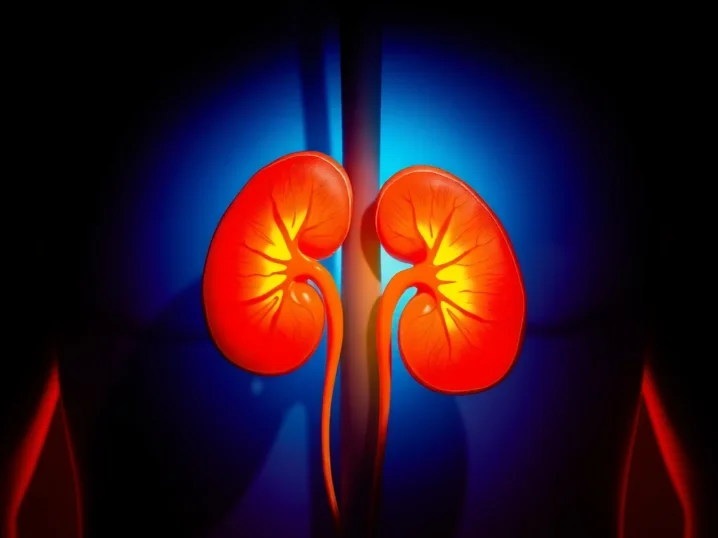kidneys are discreet organs, often overlooked by the general public, yet they play a crucial role in maintaining our health. Every day, they perform several vital functions that keep our bodies running smoothly. However, as long as everything is working fine, we rarely pay attention to them.
Understanding how the kidneys function is the first step in recognizing their importance and adopting good habits to protect them. What do they do daily? What are their specific roles? How can we ensure they are working properly?
Let’s dive into the fascinating world of these essential organs for survival.

The Kidneys: Your Body’s Powerful Filtration System
Your kidneys are like high-performance filters, constantly working to keep your body clean and balanced. These bean-shaped organs, located on either side of your spine, filter about 50 liters of blood every day, extracting around 1.5 to 2 liters of urine to remove excess waste and toxins.
The Kidneys’ Essential Role in Waste Removal 🧹
Throughout the day, your body produces various waste products from metabolism and digestion. Without your kidneys filtering these substances, toxins would build up and disrupt your health.
Some key waste products they remove include:
Urea, produced when your body breaks down proteins.
Creatinine, a byproduct of muscle activity.
Excess salt and water, helping maintain fluid balance.
Toxins from food and medications.
By continuously filtering these substances, the kidneys prevent harmful waste buildup and keep the body running efficiently.
More Than Just Filters: The Kidneys’ Vital Functions
Beyond waste removal, the kidneys play a crucial role in regulating several essential functions in the body.
⚖️ Balancing Water and Minerals
Your body needs just the right balance of water and minerals to function properly. The kidneys adjust how much water and electrolytes are retained or excreted based on your body’s needs.
If you drink too much water, the kidneys remove the excess, producing clear urine.
If you’re dehydrated, they conserve water by producing less urine.
They maintain stable levels of sodium, potassium, and calcium, which are critical for muscle function, nerve signaling, and bone health.
🩸 Regulating Blood Pressure
Your kidneys help control blood pressure by producing hormones that regulate blood vessel contraction and adjusting how much salt and water stay in the bloodstream.
When blood pressure is too high, the kidneys remove excess sodium to lower it.
When blood pressure is too low, they retain more sodium and water to increase blood volume.
💀 Bone Health and Vitamin D Activation
Your kidneys play a key role in bone health by activating vitamin D, which helps your body absorb calcium. Without this function, calcium absorption is impaired, increasing the risk of weak bones and fractures.
🛡️ Producing Red Blood Cells
The kidneys produce erythropoietin (EPO), a hormone that stimulates the bone marrow to make red blood cells. These cells carry oxygen throughout the body.
When kidney function declines, anemia can occur, leading to fatigue, shortness of breath, and decreased endurance.
What Can Damage the Kidneys?
The kidneys are resilient and can function at 50% capacity without obvious symptoms. This is why kidney disease often goes undetected until it reaches an advanced stage.
Some factors that can weaken kidney function include:
Too much salt in the diet 🧂 – Excess sodium forces the kidneys to work harder, which can damage small blood vessels and contribute to high blood pressure.
Not drinking enough water 💧 – Dehydration makes it harder for the kidneys to flush out toxins and increases the risk of kidney stones.
Uncontrolled diabetes and high blood pressure – These are the leading causes of chronic kidney disease, slowly damaging the kidneys over time.
Excessive use of certain medications 💊 – Overuse of anti-inflammatory drugs (like ibuprofen) or certain antibiotics can be harmful to kidney function.
How to Keep Your Kidneys Healthy?
The good news is that you can protect your kidneys with simple daily habits.
🥤 Stay Hydrated
Drinking 1.5 to 2 liters of water per day helps flush out waste efficiently. Adjust your intake based on climate, physical activity, and personal needs.
🥦 Eat a Balanced Diet
To support kidney health:
Reduce salt intake by avoiding processed foods.
Eat fiber-rich foods to promote overall digestion and metabolic balance.
Limit sugar, especially for those at risk of diabetes.
🏃♂️ Stay Active
Regular exercise helps maintain a healthy weight, regulate blood pressure, and improve circulation, reducing strain on the kidneys.
🚭 Avoid Harmful Substances
Smoking damages blood vessels, reducing oxygen flow to the kidneys.
Excess alcohol increases kidney workload and disrupts fluid balance.
🩺 Get Regular Health Check-Ups
If you have a family history of kidney disease, diabetes, or high blood pressure, routine kidney tests can help detect issues early.
Hemofab’s Commitment to Kidney Health
At Hemofab, we understand how crucial kidney health is, especially for those on dialysis or needing medical monitoring. Our mission is to create innovative solutions to improve the quality of life for kidney patients.
Protect Your Fistula with FAV Protector
If you are on dialysis, it's essential to protect your arteriovenous fistula (AVF) from infections and injuries. The FAV Protector, designed by Hemofab, is an innovative solution to ensure safety and comfort during dialysis.
👉 Learn more and order now: FAV Protector
Stay Informed
We will continue to share valuable insights on kidney disease, treatments, and best practices for kidney health.
💙 Take care of your kidneys—they take care of you!
📩 Sign up for our newsletter to receive expert tips and stay updated on kidney health.